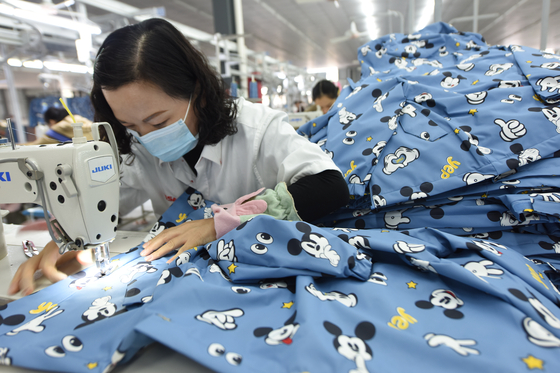![In October of last year, a worker is working at a factory in Donghai, Jiangsu Province, China.[AP=연합뉴스]](https://i0.wp.com/pds.joins.com/news/component/htmlphoto_mmdata/202101/25/ff3207c0-f747-4fcb-8aca-5acaa679facb.jpg?w=560&ssl=1)
In October of last year, a worker is working at a factory in Donghai, Jiangsu Province, China.[AP=연합뉴스]
Money knows where is a good place and where it becomes money. This is why China ranked first in history last year, overtaking the United States in attracting foreign direct investment (FDI). FDI increases when foreign companies build new factories, expand businesses, or acquire companies in certain countries.
According to the’Investment Trend Inspection Report’ released by the United Nations Conference on Trade and Development (UNCTAD) on the 25th, China was the country that received the most FDI last year. Foreign investment in China amounted to $163 billion (about 180 trillion won), up 4% from a year ago. This is the effect of rapidly resuming economic activities when countries groaned amid the shock of the novel coronavirus infection (Corona 19).
The Wall Street Journal (WSJ) analyzed that “unlike China, which had shaken off the impact of Corona 19, when the situation in other countries got worse, foreign companies considered China as a production base and poured out money.”

The reversed US-China foreign direct investment (FDI). Graphic = Younghee Kim [email protected]
On the other hand, FDI in developed countries recorded disastrous report cards. The US FDI, which has surrendered the undisputed No. 1 position to China, is 134 billion dollars (about 148 trillion won), down 49% from a year ago. The FDI of 27 countries in the European Union (US$110 billion, about 121 trillion won) shrank by 71%. In the case of Britain and Italy, where the spread of Corona 19 was strong, there was no new FDI attraction last year.
Amid the sluggishness of developed countries, the global FDI last year was $859.0 billion (about 949 trillion won), down 42% from a year ago. According to UNCTAD, the global FDI decline is the highest since the 1990s. WSJ reported that “the decline in US FDI reflects the widespread economic downturn caused by Corona 19”.
![The Tesla factory in Shanghai, China in 2019. [로이터=연합뉴스]](https://i0.wp.com/pds.joins.com/news/component/htmlphoto_mmdata/202101/25/fd524e1a-3d95-490a-be0f-a36cc1c3d33b.jpg?w=560&ssl=1)
The Tesla factory in Shanghai, China in 2019. [로이터=연합뉴스]
The flow of money to China is not new. This is the first time that China and the United States swapped first and second places, but signs of reversal emerged little by little. FDI to the US in 2016 peaked at $472 billion and then continued to decline. On the other hand, FDI to China has steadily increased since 2016 ($134 billion). Corona 19 has fueled this trend.
WSJ said, “Last year’s FDI statistics show that the center of the world economy dominated by the United States is moving to China. This change has strengthened China’s position as a’factory of the world’ amid the pandemic, and global trade It also accelerated the expansion of its share in the market.”
Investments to China are expected to continue for the time being. Even American companies are joining this rank. Wal-Mart plans to invest 3 billion yuan (about 500 billion) over five years in Wuhan, China, where the first confirmed case of Corona 19 was reported. Starbucks spends 900 million yuan (150 billion won) in China to build a roasting factory. Electric vehicle maker Tesla is also planning to expand its Shanghai plant and research facilities. Disney is pushing for a new theme in Shanghai Disneyland Park.
![The appearance of Disneyland in Shanghai, China last May.[신화=연합뉴스]](https://i0.wp.com/pds.joins.com/news/component/htmlphoto_mmdata/202101/25/f689fea5-bbc1-455e-b191-8400a7be5329.jpg?w=560&ssl=1)
The appearance of Disneyland in Shanghai, China last May.[신화=연합뉴스]
There is also a view that the former administration of Donald Trump promoted reshoring of US companies that went abroad (overseas factories returning to their home countries) and actively engaged in investment positions by foreign companies, which had a negative effect on FDI. It was read as a reinforcement of protectionism. Therefore, it is unclear whether the Joe Biden administration’s policy to expand the use of domestic products (‘by American’) will actually take effect.
![[로이터=연합뉴스]](https://i0.wp.com/pds.joins.com/news/component/htmlphoto_mmdata/202101/25/c195c968-cb3e-43af-acc4-e5dcf5c29d55.jpg?w=560&ssl=1)
[로이터=연합뉴스]
However, there is a view that the retake of the US’s No. 1 FDI is a matter of time. The situation could be different when the Corona 19 vaccine is commercialized and the US economy enters a recovery phase. Daniel Rosen, founder of Rhodium Group, a consulting firm specializing in US-China relations, said WSJ, “Unlike the US, which is an open economy, China is a closed system, so if you get out of the Corona 19 crisis, you don’t have to worry about the prospects for the recovery of FDI.”
Reporter Seungho Lee [email protected]
